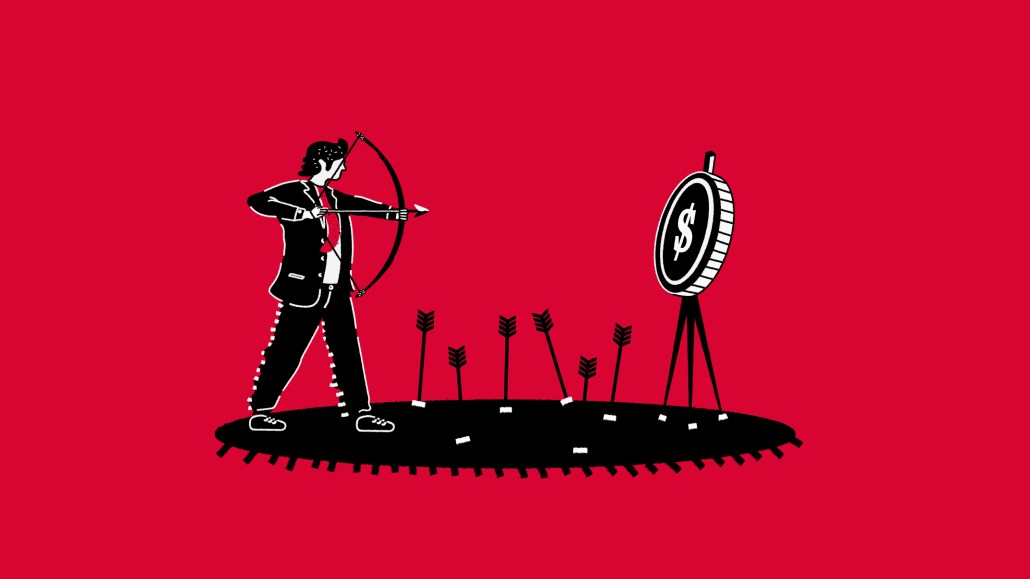Save 50% on a 3-month Digiday+ membership. Ends Dec 5.
Brands’ reactions to Queen’s death call into question the authenticity of their messages

No matter how crazy things get, you can always count on one thing: marketers will find a way to shoehorn their brands into any situation.
So when Queen Elizabeth II died yesterday (September 8) it was no surprise that there was a flurry of commemorative posts for the monarch. But just because marketers can cobble these tributes together so quickly doesn’t necessarily mean they should.
It’s not as though people were waiting to hear what Domino’s Pizza or Pizza Express had to say about The Queen. The same goes for sausage roll seller Greggs, Poundland, a convenience chain store that promises prices as low as £1, and countless other companies that scrambled some sober words and (at times) questionable artwork together to mark the event.
“If clients ask for a simple tribute — a monochromatic logo, for example — then it’s unlikely to cause an international incident,” said Nev Ridley, managing director at ilk Agency. “But during historic moments like this one, their customers won’t remember which brand uploaded a sympathetic new Twitter header, and which just paused activity for a while.”
Then again, who can blame marketers for wanting to be part of the moment? Ever since Oreo cut through the noise around the Super Bowl in 2013 with a tweet, marketers have been told that they had to react to current events in real-time — just like news organizations have always had to. Doing so, went the thinking, would drive deeper connections with their most valued followers. And marketers lapped it all up — maybe more than they should’ve. For every branded response to the event that has worked over the years, there are countless others that have failed. Moreover, the best examples of reactive marketing are never associated with tragedy.
“The fact that a commemorative post might even be thought of as “marketing” tells you all you need to know about how tasteless this can appear,” said Adam Chugg, head of big tech activations at media agency the7stars. “But what brands forget is that most people don’t want or need to hear about their opinions on most things. An understated acknowledgement of the death of such a significant public figure is where the line is drawn, and perhaps reserved for only the most applicable (those brands connected with public services, for example).”
Look at the reactions to the tributes from accounts owned by The British Kebab Awards, Playmobil, Ann Summers to name a few for proof. They left people puzzled, cynical and frustrated. Clearly, many marketers hadn’t read the room as the nation mourned.
Ad position: web_incontent_pos1
“I feel for the comms and social media managers who are trying to balance the potential criticism their brands get for staying quiet in critical moments with the cringe that can come when they participate in every ‘discourse’,” said Natalie Silverstein, Chief Innovation Officer from the influencer marketing technology company Collectively, part of The Brandtech Group:
Perhaps wary of those pitfalls, some agency execs have advised their clients to err on the side of caution.
“We have been in the process of advising our clients, ultimately deferring to their internal brand safety and suitability protocols, but recommending they either pause activity for 24 to 48 hours and observe or actively address the issue in a responsible and respectful manner,” said Daisy Domenghini, managing director EMEA for VaynerMedia.
ilk Agency’s Ridley expanded on the point: “Unless you’re representing a big public sector client or an organization with direct links to the Queen, our advice is often just to pause. As with so many emotionally charged situations, the cost of getting things wrong will always be higher than the cost of remaining silent.”
At its best, real-time marketing allows brands to use data to instantaneously shift to meet the needs of a changing situation. “A great example is weather — it’s gotten hot out, so now is the time for a marketer to post that ad about its icy drinks,” said Ross Ramon, CEO of the demand generation and digital advertising company Orange142, part of Direct Digital Holdings. “But when it comes to major world events, it behooves brands to take a breath or two before trying to rise to the occasion.”
Ad position: web_incontent_pos2
Granted, this is easier said than done. For many marketers, as Ridley noted, their particular brand is the center of the universe. Its the loudest and most important voice, and their natural priority. But marketers are there to see the bigger picture for their businesses. Sometimes they don’t need to be part of the conversation. Brands can listen and reflect, too. And at moments like this, they should, said Ridley.
More in Marketing

Ulta, Best Buy and Adidas dominate AI holiday shopping mentions
The brands that are seeing the biggest boost from this shift in consumer behavior are some of the biggest retailers.

U.K. retailer Boots leads brand efforts to invest in ad creative’s data layer
For media dollars to make an impact, brands need ad creative that actually hits. More CMOs are investing in pre- and post-flight measurement.
Ad position: web_bfu



